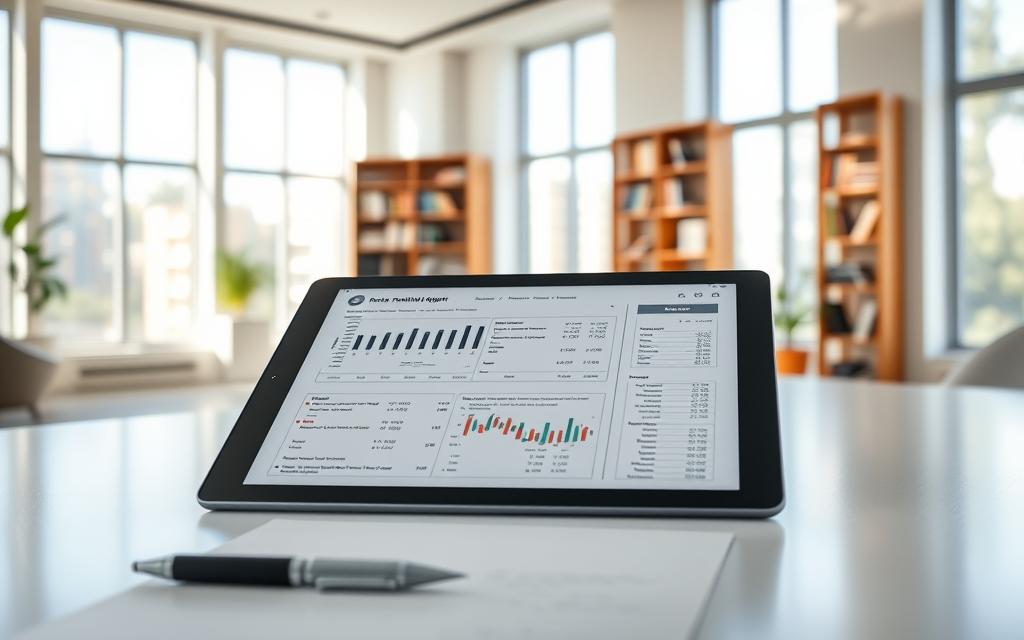Advertisement
Did you know that over 80% of Americans have some debt? This could be from student loans, credit cards, or car payments. The weight of this debt can feel very heavy. But, there’s good news! This guide will help you learn how to become debt-free step by step.
We’ll provide useful tips and a clear plan to tackle your debt. This way, you can gain control of your finances. And, you’ll find peace of mind. With our help, moving toward a debt-free life is totally possible.
Understanding Your Debt Situation
Starting with an assessment of your debts is key to paying them off wisely. You’ll find debts are either revolving loans or installment loans. Knowing the difference helps choose the right plan to manage your debt.
Analyze Your Debt Types
Revolving loans, like credit cards, offer you the chance to borrow repeatedly up to a certain limit. Installment loans, such as student or car loans, have fixed payments over time. Deciding which debts to pay first is crucial for effective budgeting.
Create a Debt Inventory
Make a list of all your debts, including how much you owe and the interest rates. This overview helps you keep track of your progress. Checking your credit report can also provide accurate details about your debts.
| Debt Type | Total Amount Owed | Interest Rate |
|---|---|---|
| Credit Card Debt | $5,000 | 18% |
| Student Loan | $15,000 | 4.5% |
| Car Loan | $8,000 | 6% |
Checking your debt regularly is important. It keeps you informed. Using smart strategies can lead you to financial freedom.

Develop a Realistic Budget
Creating a realistic budget is key for financial freedom. It starts with knowing all your income and tracking what you spend. Keeping detailed records shows where your money goes. This leads to smarter financial choices.
Identify Income Sources
Recognizing all income sources is crucial for a good budget. This includes wages, freelance earnings, rental profits, and investment dividends. Knowing your total income sets the stage for financial stability.
Track Your Expenses
It’s important to monitor your spending by category. Essential costs usually cover:
- Housing
- Utilities
- Transportation
- Food
- Minimum debt payments
Tools like Empower or Mint make tracking simpler. They show where your money goes and help find ways to save.
Set Spending Limits
Spending limits save money for paying off debt and living well. Clear limits help stick to your financial plan, boosting discipline. Even little changes can bigly improve your finances.

Prioritize Your Debts
Managing debts well means knowing what order to pay them off. It’s smart to look at interest rates and how much you owe. This helps you choose how to pay them back wisely. Focus on the debts with high interest first since they cost more over time. This way, you can pick the best plan to reduce your debt.
High-Interest vs. Low-Interest Debts
Credit card debt carries high interest and slows down your financial growth. Paying these debts off first saves you a lot of interest money. This means you’ll have more money to bring down your total debt. Meanwhile, low-interest debts, like some student loans, don’t need quick action. Getting rid of high-interest debts first helps you deal with big costs upfront, leading to better management of your finances.
The Debt Snowball Method
The Snowball Method helps you feel good as you pay off debt. It’s about clearing smaller debts first to gain momentum. You start by paying minimums on everything but the smallest debt.
Put any extra cash towards this small debt until it’s gone. Then, tackle the next smallest one. This keeps you motivated and speeds up your debt-free journey, especially if you like quick results.
The Debt Avalanche Method
The Debt Avalanche Method focuses on high-interest debts first. This saves you money on interest in the long run, which helps financially. List your debts from highest to lowest interest rate. Pay more than the minimum on the top-rate debt.
Keep doing this until that debt is zero. Move to the next highest rate. Repeat until all debts are paid. This method is great for saving money over time.
Explore Debt Repayment Strategies
Finding the right way to pay off debt is crucial for gaining financial freedom. There are many methods out there that can make repayments easier and lower stress. By checking out these options, you can find what works best for you and your financial goals.
Debt Consolidation
For many, debt consolidation is a smart choice. It turns multiple debts into one loan with a lower interest rate. This makes monthly payments easier to handle. It also makes your financial life simpler, giving you a clear view of what you owe.
Balance Transfer Credit Cards
Balance transfer credit cards are helpful for managing high-interest debt. They often have zero percent APR periods. This can save you on interest costs and help you pay off the principal faster. It’s a good way to reduce financial stress quicker.
Negotiating with Creditors
Talking directly to creditors can be very beneficial. Many are open to adjusting terms, like lowering interest rates or changing payment amounts. This way, you can agree on terms that fit your financial situation and make repayment easier.
| Debt Repayment Strategy | Advantages | Considerations |
|---|---|---|
| Debt Consolidation | Simplifies payments, potential for lower interest rates | May require good credit for favorable terms |
| Balance Transfer Credit Cards | 0% APR promotions offer temporary relief from interest | Can accrue fees, high rates resume after promo ends |
| Negotiating with Creditors | Personalized solutions, possible reduction in overall debt | Requires adherence to new payment terms |
Increase Your Income
Making more money is key for a strong financial freedom plan. By looking into different ways, you can earn extra cash for paying off debts. You have many choices to boost what you make, which helps follow debt relief tips better. Options like a side job, freelance work, or selling stuff you don’t need each offer unique advantages.
Side Hustle Ideas
Side hustles give you freedom and a chance to make money your way. You can drive for ride-sharing companies, watch pets, or deliver food. These jobs fit your time and help earn more to pay off your debts.
Freelancing Opportunities
Freelancing lets you use your skills to make extra money. Sites like Upwork and Fiverr help connect freelancers with clients who need things like design or writing. This way, your abilities can bring in money that helps with your plan for financial freedom.
Sell Unwanted Items
Cleaning out your house can bring in quick money. Selling things you don’t need on eBay or Facebook Marketplace is an easy step. By putting this money toward your debts, you speed up repayment and get closer to financial stability.
Cut Unnecessary Expenses
Lowering your monthly expenses is key to budgeting for getting rid of debt. Small changes in how you spend can help free up money for paying off debt. Looking closely at your spending can uncover savings, particularly by spotting costs you don’t really need.
Review Subscriptions and Memberships
Many people ignore ongoing subscriptions and memberships that waste money without adding much value. It’s important to check every subscription carefully. Get rid of those you don’t use or need anymore. This easy step is a great way to cut debt, letting you use that money to pay it off instead.
Shop Smarter
Being wise with your shopping can really help your finances. Use discount stores and look for sales to spend less on groceries and home goods. Check prices in different places and online to snag the best deals. Adding these habits to your shopping can really help with budgeting for debt elimination.
Cook at Home
Cooking at home saves a lot more money than eating out. Planning your meals and cooking yourself cuts down on spending for takeout and dining at restaurants. Planning your meals lets you choose ingredients and portions wisely. This saves money and is healthier, which helps with your finance goals in the long run.
Understand the Impact of Credit Scores
Knowing how credit scores work is key to managing your debts well. A good credit score means you get lower interest rates. This helps make paying off debt easier. Meanwhile, a low score leads to higher costs and strict terms. Keeping up with payments boosts your score and changes how you deal with credit card debt.
How Credit Scores Affect Debt
Your credit score shows if you’re good with money. Banks look at it to decide if they should lend you money and at what rate. A higher score usually means you get:
- Lower interest rates on loans
- Better chances of credit card approval
- Higher limits on what you can borrow
If your score is low, it means higher expenses and fewer loan options. So, it’s important to know and manage what influences your score.
Tips to Improve Your Credit Score
Raising your credit score takes effort and good habits. Here are some tips:
- Pay bills on time to show you’re reliable.
- Work on lowering your overall debt.
- Check your credit report and fix any mistakes.
Using these steps can make your financial life better. It can lead to better ways to handle credit card debt and improve your finances.
Seek Professional Help if Necessary
When you’re drowning in debt, getting professional help can be a lifeline. Credit counseling services provide advice based on your financial situation. They help with budget making and creating plans for debt management.
Certified counselors can talk to your creditors to reduce your interest rates and arrange payments you can afford. This helps reduce stress over debt. It’s vital to pick a credit counseling service that fits your needs well.
Debt settlement companies offer a different kind of help. They negotiate to let you pay off debt for less than you owe. While this sounds good, remember they charge fees. It’s essential to understand these costs as part of your debt relief plan.
| Service Type | Pros | Cons |
|---|---|---|
| Credit Counseling | Personalized budgeting help, creditor negotiation | May have associated fees, results vary |
| Debt Settlement | Potentially lower debt amounts, can resolve multiple debts | Fees involved, may impact credit score negatively |
Maintain Financial Discipline
Getting to financial freedom needs strong financial discipline. This becomes key when you work on debt management. It’s important to stick to your budget, tracking how you spend money carefully.
Sticking to Your Budget
A budget acts like a guide for your money. To stay true to it, compare your spending to your budget often. Making small changes helps you keep on course. Tools or apps are handy for keeping an eye on your money, showing where it goes.
Avoiding Future Debt
Learning how to avoid more debt protects your financial well-being. Make smart choices with your spending. Aim to live within your means, steering clear of credit card reliance for buying things. An emergency fund is key. It guards against sudden costs, helping avoid new debt. The habits you form now are vital for financial success in the long run.
Monitor Your Progress
Keeping an eye on your progress is key to getting debt-free. Checking your financial health lets you see any problems while you stay on track with your goals from your debt repayment plan. By using financial apps or keeping a spreadsheet, you can easily see where you stand. This makes it easier to change your plan when you need to.
Regularly Review Your Financial Health
Create a timetable to look over your finances. Doing this monthly or every three months helps you stick to your debt-paying budget. When reviewing, write down your debts, how much you make, and any new expenses. Seeing patterns helps you stay motivated and make better choices about paying off debt.
Adjust Your Plans as Necessary
Being able to change your debt-paying plan is important. Life can be unpredictable, and your budget might need changes. If your income changes or you have new bills, look over your budget again. Changing your plan in time can stop future problems in your journey to pay off debt.
| Review Frequency | Actions to Take | Key Indicators |
|---|---|---|
| Monthly | Track all income and expenses | Debt-to-Income Ratio |
| Quarterly | Assess progress towards debt elimination | Payment Consistency |
| Annually | Evaluate long-term financial goals | Credit Score Changes |
Celebrate Milestones in Your Journey
As you move forward with your plan for financial freedom, it’s important to celebrate your achievements. Setting goals you can actually reach helps you see how far you’ve come. Celebrating small wins, like paying off a debt or sticking to your budget, shows you’re on the right path.
Setting Achievable Goals
Creating realistic goals is key when managing your debt. Aim for clear, small goals like getting rid of one payment or cutting back on expenses. This gives you a real sense of progress and keeps you motivated toward greater financial health.
Rewarding Yourself Without Overspending
It’s essential to reward yourself as you pay down debt, but you must stay careful with spending. Think of affordable ways to celebrate, like a simple outing or enjoying a meal you love. This way, your celebrations help you move forward instead of setting you back.



